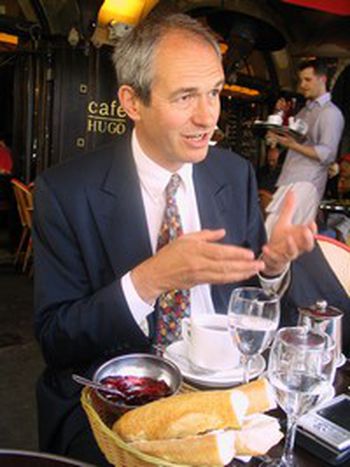
Richard Corbett, beer and European politics
Published on
Translation by:
 claire mcbride
claire mcbride
As a politician in the European Parliament, Richard Corbett from Leeds deals with many different fields, including animal protection, varieties of beer, software patents and – above all – the EU constitution.
His multi-coloured tie flutters in the spring breeze at the Place de Vosges as Richard Corbett, a Labour MEP, shares brunch with café babel. No taxi or service limousine drove the Brit through Paris to his culinary tête-à-tête with the ‘Eurogeneration’: despite his 20 year career in the European political circus, Corbett has not lost his approachability or his down-to-earth character.
Small brewers, huge politics
To my first question, “would you like a beer?”, Corbett replies with a mischievous smile, “Good idea, why not?” It is half-past tweleve: not too late for brunch and certainly not too early for a beer for a member of the Beer Club of the European Parliament. However, this drinkers’ gathering, which I imagine as an oasis of sociability in a jungle of Brussels committees, is by no means a hedonistic event for the exhausted representatives of the people. Everything is politics in Brussels, even the beer: “Every six months we have an evening to present beers from a certain region. Small breweries usually supply the beer for free and we discuss the issues affecting the beer industry; takeovers for instance, which threaten the variety of beers, and [misleading] labelling.” Corbett hopes that eventually the European consumer will know what he is drinking. However, the brunch drunkenness I had hoped for was sobered up by the French waiter: only a warm drink can be taken with brunch and that’s that, explained the waiter coolly - not even for an extra charge. There is no European directive against inflexibility, and so we drink tea with our toast.
“Britain is easy”
For Corbett, who in his student days was involved in the Yes campaign for the 1975 British referendum on whether or not the UK should stay in the EU, France has always shown herself to be more Eurosceptic than Great Britain. From the rejection of the European Defence Community by the French Parliament in 1954 to the de Gaulle veto of British entry to the EU in 1963; from the extremely close majority for the Maastricht Treaty in 1992 to the rejection of the EU constitution: “France has always been ambivalent towards or divided on Europe. In comparison, the situation in Great Britain is simple!”
However, selling Europe in the UK is not so simple, which Corbett says is mainly due to the hostility of the British press towards Europe: “From The Times to The Sun, from the quality to the tabloid press, every week there are anti-European stories.” Thus, as standard, the EU is deliberately portrayed as either stupid or evil. “The combined effect of the press and an opposition party that tries to exploit public opinion by criticising Europe makes things difficult. However, we’re not giving up!”
From Switzerland to the island
Corbett inherited international blood. Since his father worked for the World Health Organisation, as a teenager he lived in Geneva for several years and went to an international school. “When I returned to study in Britain, I found it very insular, very parochial in many ways. I then I started fighting that.” Corbett, Vice-President of the European Movement in the UK, is a committed supporter of the idea of a European Federal State. However on his website he painstakingly avoids the word ‘federalism’. Does he have to hide his conviction from a Eurosceptical electorate? “For most Brits, federalism means everything will be centralised to Brussels – but that’s not true, federalism is the opposite of centralisation!” Indeed, the EU is not a centralised system, rather it is a decentralised one. “The European Commission has fewer employees than Leeds City Council!” However, this truth is difficult to get across to his countrymen, a busload of whom are just passing by our table.
Long live the constitution
So what vision does this British friend of Europe have for the future of the continent? Typical of all politicians, he does not reveal his concrete vision for the future Europe. Should Ukraine, Russia or Morocco be in the EU? “The decision is in the hands of future generations. In the short term we should just see that the Constitution comes into force.” It simplifies the legal basis of the Union significantly by replacing the complex system of treaties which has grown over 50 year. “The treaties are like geological layers created over one another, which even lawyers find difficult to understand.” But even Corbett, the Socialist Group’s spokesperson on the Constitutional Committee of the European Parliament, isn’t totally content with the text. He believes a bi-chamber system should be introduced to strengthen the roll of the Parliament as a democratic body. Also the confusing third part, which is an amalgam of all previous treaties, shouldn’t be integrated in the constitution itself.
From great ideas, which increasingly appear to be pipedreams, back to the everyday life of a European politician. A legal project concerning chemicals comes next, says Corbett, putting the last piece of cheese in his mouth. Apparently, everyone has between 30 and 60 chemicals in their body which weren’t present in their parents’. In order to analyse and catalogue all these potentially dangerous chemicals, the EU has created a programme called REACH, despite resistance from the chemical industry. But can the resistance of Europeans to the constitution be tempered by such EU efforts to improve its citizens’ well-being? Good luck Mr Corbett…
Translated from Richard Corbett: Bier und Europapolitik


